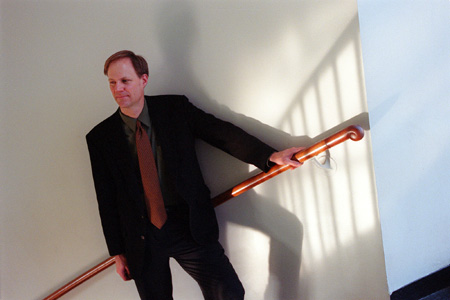Hansen assesses Americans’ fitness to govern themselves

John Mark Hansen, newly appointed professor of government, stands squarely at the intersection of the public and policy. Much of Hansen’s research, from questioning how and why voters vote to exploring citizens’ understanding of budgeting, probes one of America’s guiding principles: We the people govern the country by our preferences. Whether or not we are fit to rule with those preferences is one issue that Hansen’s research continually raises.
Hansen believes that we are. “Most political scientists, including myself, tend to be small-D democrats, who might acknowledge that there are certainly inefficiencies that arise from democratic government but would believe that the principles of democratic equality and democratic accountability outweigh those inefficiencies,” says Hansen.
“On the other hand, I’m glad I don’t live in California where they vote on everything,” he adds, noting the state has upwards of 35 ballot propositions every election.
A return to research
Hansen came to Harvard this fall from the University of Chicago, where he taught for 15 years, most recently as the William R. Kenan Jr. Professor of Political Science. A native of Kansas, Hansen received his Ph.D. from Yale. After years in administration – he was the University of Chicago’s political science department chair from 1995 to 1998 and the associate provost from 1998 to 2001 – he looks forward to returning to some of the research projects he had put on the back burner.
Federal budgeting is one lens through which Hansen is viewing the public’s political fitness. He’s several papers from completing a project that researches “the way that people understand the public budget or public policy, and the relationship between public policy and their own needs and preferences,” he says. When faced with choices over budgetary trade-offs, do people make rational decisions? Or do they say, for instance, that they want to cut taxes by decreasing domestic spending, then decide that they would like to boost domestic spending and increase taxes?
“There has been a lot of skepticism both within political science and within the popular discourse about people’s ability to make sense of these kinds of tradeoffs,” he says. Hansen’s early findings show that, for the most part, the public is up to the task of democracy; people’s decisions demonstrate a rational understanding of budgetary tradeoffs.
The author of “Gaining Access: Congress and the Farm Lobby, 1919 – 1981” (1991) and “Mobilization, Participation, and Democracy in America” (with Steven J. Rosenstone, 1993), Hansen is also finishing a paper that looks at the political leadership of bureaucracies.
In particular, his research focuses on an episode that took place during the 1930s and ’40s at the U.S. Department of Agriculture. The incident illustrates the complex relationships between political and bureaucratic leadership. The secretary of agriculture implemented a far-reaching reorganization of the department that limited the influence of one of its most popular constituents, an agency with close relationships to farmers. “It’s trying to understand a story about democratic administration and the parts of bureaucracies that are responsive to national political leadership,” says Hansen.
Beyond butterfly ballots
Hansen applies his expertise to current events, as well, most recently leading a task force of the National Commission on Federal Election Reform, formed in the wake of the 2000 presidential election. His task force went beyond butterfly ballots and voting machines to explore institutions – voter registration, proportional representation, ballot access requirements, residency requirements – that impact election outcomes.
“One of the things that was interesting about this last election … it all of a sudden hits you that as a voter, one is enfranchised only within those constituencies in which one lives,” he says. “You can’t be 30 miles away at work and go vote, you have to go back home to vote.” His task force’s work might recommend changing that with statewide voter registration lists and real-time access to voter activity.
Hansen is part of a proposal that would study the 2002 federal election, a project that, if funded, may involve some of his Harvard doctoral students. Instead of investigating the psychology of voter choice, this proposal seeks to study how people understand and evaluate political concepts, such as representation.
An interest in interest groups
At Harvard, Hansen is teaching two courses on interest group politics, the subject on which he says he’s published the most research. While the subject matter is essentially the same for both the undergraduate and graduate courses, his approach is different. “Undergraduate courses are not just simplified versions of graduate courses,” he says.
While graduate students are learning to be research scholars, most of the undergraduates Hansen teaches will not become professional political scientists. For the College students, his focus is more on critical thinking. “If someone came up and said to you, ‘interest groups are really powerful,’ … how in the world would you know that interest groups are powerful, or that they’re not powerful?” he asks. “How can you critically assess the kinds of claims that are made in politics?”
Drawing on readings by people who are not political scientists, Hansen opens his undergraduate course on interest groups with a book on the Anti-Saloon League of the prohibition era. Despite his students’ relative sophistication and diversity, Hansen says, “They look at these prohibitionists like they dropped in from Mars. I find it kind of amusing to juxtapose the cultural sensibilities of today’s students against the cultural sensibilities of the political leaders of yesteryear.”
Martian teetotalers notwithstanding, Hansen is excited about the cosmopolitan community of Harvard. “There are a lot of people doing lots of different things, not just producing scholarship, but being active in public intellectual life, being active in public policy debate, trying to intervene in social processes in ways that would make life better for people,” he says. “There’s a richness of possibilities that is unusual among American universities.”




